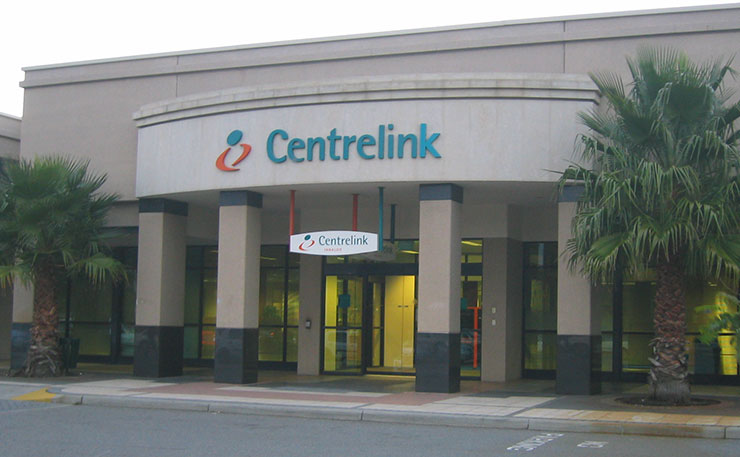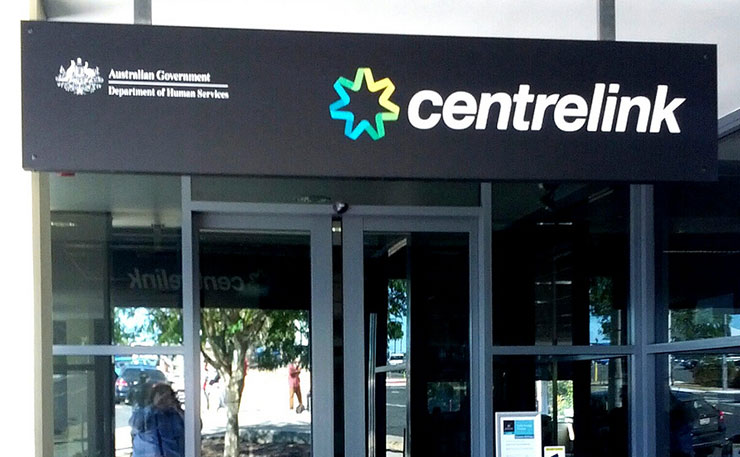In the lead-up to Christmas, tens of thousands of Australians started receiving threatening debt collection notices from Centrelink and its agents. Coming from a government that couldn’t run an online census, you can probably guess what happened. Ben Eltham explains just in case you can’t.
The worried emails and social media posts starting piling up in my inbox in December.
The problem? Centrelink. The government’s monolithic welfare agency is sending nasty letters to people out of the blue.
The government is calling it a “new online compliance system.” I prefer the catchy phrase “robo-debt.”
In the week before Christmas, thousands of Australians received letters or communications from Centrelink, or its appointed debt collectors.
Some received scary letters, informing them of debts in the thousands of dollars. Some logged into MyGov, the government’s creaking online information portal, to try and make a Medicare claim, only to discover a message that they owed thousands.
For others, the news came in a more threatening form: dozens of missed phone calls, culminating in threatening answering machine messages from debt collectors. Once again, the message was terrifying: they owed Centrelink thousands for an over-payment they knew nothing about.
For many, the debts that they owed to Centrelink were utterly mysterious. They had reported their income correctly at the time. There was simply no evidence that they had ever been over-paid.
The robo-debt dragnet began back in September. It has already generated considerable community anguish and concern. 169,000 robo-debt notices have already been sent.
We’ll call one Centrelink client we spoke to ‘Sally’. Her experience is indicative of what some people are going through.
“For about two weeks, I was struggling with some pretty serious anxiety as a result of daily automated phone messages and texts telling me I owed a debt. Some did not even identify themselves.
After a while, I typed the debt collectors’ name into a Google search, assuming it was some sort of phishing scam and found others saying it was on behalf of Centrelink. I called Centrelink, who confirmed that I had a debt and needed to pay the collectors directly as it was now out of their hands.
They had already taken my last tax return to help pay the debt.”
We spoke to another client, who we’ll call ‘Luke.’
“I have received a debt recovery notice from Dun and Bradstreet on behalf of the Department of Human Services, asking to be paid immediately! This is very distressing as I received this notice on Friday 22nd December, just before Christmas.
The issue is still unresolved as I spoke with a Centrelink staff person (after an hour wait). This person asked me to hold (again) while she spoke with somebody from Debt Recovery, but I was not able to speak with them, as they were ‘extremely busy’. They took my mobile number and told me they will be calling in the next 14 days. I was told there was nothing else I could do!
I have all my statements and Centrelink correspondence. The dates do not correlate and the amount is ridiculous.
Luke is in remission from an aggressive cancer. He was briefly on sickness allowance several years ago.
One of the most insidious aspects of the Centrelink dragnet is that people who have been issued with false robo-debt notices are no longer allowed to leave the country.
New Matilda spoke to one client, who we’ll call ‘Angus.’
They used the usual crude calculation without regard for casual work: annual income from the ATO averaged over a whole year. I corrected that, but am still awaiting new assessment.
My stress concerns the travel ban: I’m due to leave for Germany on January 10.
Angus is travelling to Germany on a one-way ticket to take up a job at a university there. “I can’t get any information,” he told us. “It’s very stressful.”
In the past week, New Matilda has spoken to more than 30 Centrelink clients who claim that they have been issued a debt notice in error.
The most common issues for Centrelink clients that we spoke to were simple and glaring errors of data, like incorrect names for employers, or mismatched annual and fortnightly earnings.
One Centrelink client, ‘Julie’, told us that “they simply took my annual income for that year and averaged it over all fortnights (which would have made me ineligible) instead of the actual dates of payment/employment.”
Many others echoed her complaint:
“They averaged out my annual income over the full 52 weeks, meaning I was ‘overpaid’ some weeks. I called and spent two hours on the phone, the guy prefaced our chat by saying ‘Centrelink is never wrong, you’re going to have to pay’.
Once I emerged from the chaos of the first four weeks, I discovered that the debt had already been escalated to a collection agency. They are consistently hassling me and have informed me they can ‘garnish’ my wages and take the money from my bank account.”
Like the government’s last data debacle, the 2016 Census, it’s clear that there are massive IT failures here. This is not just a few glitches and bugs. A government department is sending out tens of thousands of erroneous communications accusing welfare recipients of over-payment. The government is falsely accusing some of the most vulnerable members of our community.
The stories of misery have quickly filled up large swathes of the media: the Guardian has reported on it in detail, thanks to the diligent work of Christopher Knaus, as has Crikey and Triple J’s Hack program. On Twitter, Asher Wolf has been an active citizen-journalist.
The outpouring of misery on social media also shows the scale of Centrelink’s robo-debt failure. The psychological impacts of the heavy-handed government grab should be obvious. Independent MP Andrew Wilkie has already documented several cases of Centrelink clients “who I would describe as presenting as suicidal.”
New Matilda has also spoken to two Centrelink clients who have reported feeling suicidal ideation in the wake of receiving their Centrelink robo-debt.
In a typical example of the sociopathic nature of Centrelink’s behaviour, the agency has used Twitter throughout 2016 to refer people affected by debt issues to counselling service Lifeline.
Why is the robo-debt algorithm so erroneous? Time and again, one key issue that clients raise is that the system cannot differentiate between annual income and fortnightly income profiles.
New Matilda has heard from multiple sources inside Centrelink that the system cannot distinguish between the annual earnings figures provided by the Australian Tax Office, and the more granular fortnightly earnings profiles that most Centrelink payments are assessed against.
The two data sets measure different things, and they should not be used as interchangeable tests for over-payment.
Annual salary figures provide just that: an annual sum of earnings from a particular employer. But many payments are assessed fortnightly, and so an average figure will be wildly inconsistent with the fortnightly profile of a client’s earnings.
But that’s just the tip of the iceberg. Even the most basic details, such as employers’ names, appear to be frequently in error. Many clients reported to us that rudimentary mistakes were recorded that any human could have picked up, for instance typos, ABN input errors, or that the ATO or Centrelink had confused trade names and business names of employers.
New Matilda has spoken to a source inside Centrelink who confirms that the robo-debt dragnet is completely broken.
“It’s a flawed system,” the source told us. “To use an analogy, it’s like using a sledgehammer to perform open heart surgery.
“Let’s say someone is on Newstart or sickness allowance for eight weeks. During that time they receive little to no income. When they return to work for the rest of the year they obviously earn, and they subsequently lodge a tax return.”
In this scenario, they will still be sent a letter claiming they owe thousands of dollars, when in fact they don’t.

The Centrelink source told us that “the earnings might be spot on and recorded correctly, but the automated system is not going to be able to reconcile all of those instances with a data match. [It] is inevitably going to end in a letter, even though the calculations during the time on benefits were likely correct.”
In other words, the new system appears purpose built to generate as many robo-debt notices as possible … perhaps in the expectation that some clients will simply pay, rather than fight the government and its aggressive tactics.
One Centrelink client that we talked to did just that. “After two weeks of feeling like I was being scammed and/or harassed, I just paid it off,” the client told us. The advantages for the government’s bottom line are obvious.
And, in fact, we know that the Department of Human Services knows about the fortnightly-payments glitch. On Twitter, Simon Elvery posted a link to an official DHS website that frankly discusses the shake-down.
“If employment is for a part of a year only, averaging over 12 months will not result in a correct result if the customer should have received a full rate at other times of the year,” the DHS document admits.
This kind of shake-down should not be acceptable as a matter of government policy. The federal government is callously pursuing tens of thousands of Australians for completely fictional ‘debts’.
Even when clients successfully respond to the robo-debt letters from Centrelink, the stress and worry is often considerable. The MyGov website is notoriously difficult to use for people who aren’t IT-savvy.
The government’s faith in the online tool as a simple and usable method for dealing with Centrelink debt notices is laughably out of touch.
The site itself is a usability disaster that makes it ridiculously difficult to perform simple tasks, like requesting the review of a debt by an Authorised Review Officer.
Some Centrelink clients are not literate enough to use a website like MyGov. Some Centrelink clients have no internet. Some in the regions have only intermittent phone reception. And yet there appears to be little sympathy in the government or the top echelons of Centrelink for such practical difficulties.
The robo-debt dragnet is extraordinarily large. According to the Coalition’s Minister for Human Services, Alan Tudge, the new system is sending out 20,000 of these compliance notices a week. “Over three years it is expected to carry out 1.7 million compliance interventions,” Tudge said in a media release on December 5.
According to Centrelink’s statement to New Matilda, “72 per cent of people who received an online compliance letter since September this year have completely resolved the matter.”
Unless our maths is wrong, that means 28 per cent of people have not resolved the matter. At a rate of 20,000 a week, the number of people affected by unresolved compliance letters must stretch into the tens of thousands.
Centrelink also says that “only 2.2 per cent of customers were requested to supply supporting documentation.” At a rate of 20,000 a week, that’s 440 a week being hit with documentation requests. It’s probably more than this, given the level of Centrelink chaos the robo-debt fiasco has revealed.
440 audits a week is a significant figure, by any measure of human dignity, let alone compliance. It dwarfs the kind of compliance efforts being directed at large corporations, let alone the government’s risible efforts to collect mining and petroleum royalties.
Indeed the very design of the policy must mean that huge numbers of Australians will be swept up in the Centrelink dragnet. The government plans to raise a whopping $3.7 billion by these methods over the forward estimates.
It’s there in the MYEFO for all to see.
“The Government will achieve savings of $3.7 billion ($2.1 billion in underlying cash terms) over four years from 2016-17 by expanding the Department of Human Services’ (DHS) fraud prevention and debt recovery capability,” the budget papers state.
“From 1 January 2017, DHS will implement a package of initiatives to enhance the integrity of social welfare payments, including expanding and extending data matching activities with the Australian Taxation Office and improving engagement with welfare recipients to ensure that they understand and meet their obligations.”
But the government’s gleeful boasts about the new online system clawing back “$4.5 million in welfare debts a day” conceals a brutal and clumsy new algorithm that appears unable to prevent even rudimentary errors.
The aggressive debt recovery policy can be seen in the context of a government that harbours a deep animosity to the concept of welfare itself. Tudge was strident in his language on welfare last year, complaining that Centrelink was too lenient on job seekers. “We must face the reality that in our desire to be a generous and caring society we may have reached a point where we have taken our good intentions too far,” he said in a policy speech in October.
In November he sent out a media release championing the government’s Taskforce Integrity, which has been prosecuting welfare fraud in the Adelaide region. “The Government is committed to strengthening the integrity of the welfare system by cracking down on fraud and overpayments to ensure taxpayers’ money only goes to those who genuinely need a helping hand.”
Tudge has also threatened people with welfare debts with jail time, should the Commonwealth successfully prosecute them.
“We’ll find you, we’ll track you down and you will have to repay those debts and you may end up in prison,” he told Nine’s A Current Affair on December 5.

One theory to explain the government’s intransigence is that it believes being tough on welfare is a political positive, signalling to voters that it will crack down on rorters and bludgers.
This may explain why the government doesn’t care about the glitches. It’s quite happy with the new system. It’s part of a concerted attempt to wring every last cent out of Centrelink, whatever the consequences for individuals.
Social Services Minister Christian Porter (filling in for the holidaying Alan Tudge) has been crystal clear about the robo-debt letters: this is exactly what the government intends. “I think that this is about as reasonable a process as you could possibly derive,” Porter told ABC’s Radio National this week.
As for Centrelink, the agency’s official position is that there is no problem. Centrelink’s Hank Jongen told New Matilda in a response to our queries that “we are confident in the online compliance system, and associated checking process that we go through with recipients.”
In the past, staff manually checked customer records against data provided by other government agencies such as the Australian Taxation Office. While the new online compliance system automates part of this process, it does not change how income is assessed or how debts are calculated – it is an easy way to confirm details and resolve any outstanding matters.
When data differences are detected, the system generates a letter (this is not a debt letter) advising people of the difference and asking them to either confirm or update their details online using myGov.
Jongen finished his statement with a resounding declaration that “the department is determined to ensure that people get what they are entitled to, nothing more, nothing less.”
Jongen’s insouciance conceals the fact that Centrelink is in crisis. New Matilda spoke to a source in the union representing Centrelink, the CPSU. She pointed out that staff at Centrelink are already striking over the government’s stalled enterprise bargaining negotiations, and that morale inside the agency is at rock bottom in the wake of the automation changes.
“The decision to automate was one of cutting the costs of labour, but it is one that will cost the department many times over because of the shoddy computer systems they are using,” the CPSU source told us.
The joke inside Centrelink is that the Department of Human Services should really be called the “Department of Computer Non-Services”, because the automation is so chaotic and mismanaged.
“Many CPSU members state that the workplace has become unbearable,” the source continued. “They are in a situation where everyone is on edge, poor policy decisions are being forced upon them, the work has become very stressful and they are seeing an erosion of their working conditions which they are fighting desperately for.”
As for the Minister, Alan Tudge? New Matilda tried to contact Minister Tudge a number of times for comment in relation to this story.
Tudge is “on leave”, according to his media advisor. Apparently happy with the robo-debt fiasco, Tudge went on holidays in mid-December, and has been refusing to front the media ever since.
On the 8th of January, Tudge was still on holidays. Meanwhile, the crisis in his portfolio is spiralling out of control.
Donate To New Matilda
New Matilda is a small, independent media outlet. We survive through reader contributions, and never losing a lawsuit. If you got something from this article, giving something back helps us to continue speaking truth to power. Every little bit counts.





